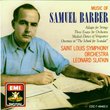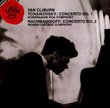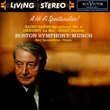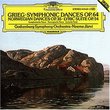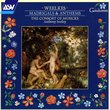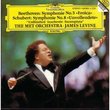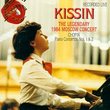| All Artists: Paul Dukas, Camille Saint-Saens, James Levine, Berliner Philharmoniker, Simon Preston Title: Saint-SaŽns: Symphony No. 3 "Organ"; Dukas: L'Apprenti Sorcier (The Sorcerer's Apprentice) Members Wishing: 0 Total Copies: 1 Label: Deutsche Grammophon Release Date: 10/25/1990 Genre: Classical Style: Symphonies Number of Discs: 1 SwapaCD Credits: 1 UPC: 028941961723 |
Search - Paul Dukas, Camille Saint-Saens, James Levine :: Saint-SaŽns: Symphony No. 3 "Organ"; Dukas: L'Apprenti Sorcier (The Sorcerer's Apprentice)
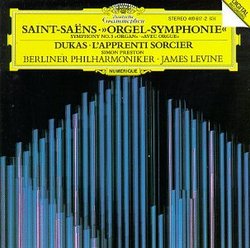 | Paul Dukas, Camille Saint-Saens, James Levine Saint-SaŽns: Symphony No. 3 "Organ"; Dukas: L'Apprenti Sorcier (The Sorcerer's Apprentice) Genre: Classical
James Levine's is currently the hottest version of the Sorcerer, rivalling the old Toscanini account in impetuosity, but far better recorded. The choice of companion piece is a good one, though the length (47:05) is unplea... more » ![header=[] body=[This CD is available to be requested as disc only.]](/images/attributes/disc.png?v=a4e11020) ![header=[] body=[This CD is available to be requested with the disc and back insert.]](/images/attributes/disc_back.png?v=a4e11020) ![header=[] body=[This CD is available to be requested with the disc and front insert.]](/images/attributes/disc_front.png?v=a4e11020) ![header=[] body=[This CD is available to be requested with the disc, front and back inserts.]](/images/attributes/disc_front_back.png?v=a4e11020) |
Larger Image |
CD DetailsSynopsis
Amazon.com James Levine's is currently the hottest version of the Sorcerer, rivalling the old Toscanini account in impetuosity, but far better recorded. The choice of companion piece is a good one, though the length (47:05) is unpleasantly short for a full-price disc. --Ted Libbey Similarly Requested CDs
|
CD ReviewsA towering performance of a magnificent symphony. N. Daniele Pietro | Milano, MI Italy | 05/16/2000 (5 out of 5 stars) "Probably 90% of Saint-Saens' discography is formed by recordings of a few masterpieces: this one, and some concertos ( Piano n.2, Cello n.1, Violin n.3). Not a bad achievement for a composer sometimes accused by the snobbier critics of being academic, but a pity nonetheless, because his large output deserves a deeper knowledge. Try, for example, the 5 piano Concertos on Emi (Collard/RPO/Previn) or the little-known other four symphonies (there are a mid-price 2-disc set from Martinon/Emi and a splendid, hard-to-find Erato disc that couples n.1&2 conducted by Pretre). Maybe Saint-Saens wasn't the most profound of the composers but, at his best, he had a prodigiously fluent, charming inventiveness and superbly accomplished technique. Levine's task was very challenging, but in my opinion he scores over all his competitors, even the most revered (Karajan, Ormandy, Maazel). There's a sense of thrill and theatrical grandeur about this performance that I find irresistible, and this is achieved without brashness or vulgarity. Actually there are several finely nuanced moments: the slow movement (strings with haunting organ chords in the background) is wonderful and the part for pianoforte concertante has never been so clearly and delicately presented. I think that the decision to record the organ together with the orchestra -very often they are taped separately-, greatly contributed to the sense of occasion and Simon Preston's is a superb contribution: his entry in the finale, for example, is not merely loud, but genuinely majestic. The Berliners play marvelously for Levine: every orchestral section (and S.-S. uses them all without inhibitions!) displays that blend of aristocratic virtuosity and white-hot intensity that is almost unmatched by any other orchestra. Also , the Dukas is more than a simple fill-up, because it's presented with a thrust and fire to rival Stokowski , and there's no higher praise! Unlike many other DG horribly coarse recordings from the 80's, this is also well recorded: if the tutti are still a bit brash, the overall sound is incredibly full and immediate , analitically captured by the engineers and massively delivered to the listener, with stunning dynamics. An all-time personal favorite." A wild Sorcerer Rafael Rodriguez | Costa Rica | 12/29/1999 (5 out of 5 stars) "Duka's piece is wildly performed, Levine makes the orchestra run desperatly through the work. A really beautifull one. The best I've heard. Not to mention the powerfull performance of Saint-Saëns most popular symphony. Even though the price could be considered high for the full-lenght of the CD, I think it is a valuable recording to have." Fantastic Prescott Cunningham Moore | 04/05/2004 (5 out of 5 stars) "This is the CD to buy if you are looking for the definitive recorded version of both Saint-Saëns' great "Organ" Symphony and Dukas' Sorcerer's Apprentice. James Levine brings vision and energy to these famous orchestral staples. Levine and the Berlin Philharmonic Orchestra play with vigor, power, and gusto in this polished, yet spontaneous sounding recording from DG. I will agree with some of the other reviewers in saying that the performance does not sound particularly "French." Indeed, the orchestral forces are not as smooth as in Dutiot's recoding or as idiomatic as with Munch. As with most modern Berlin recordings, the strings still retain the famous (or infamous) Karajan sound, the brass is tubby, but powerful, and the winds, while recessed, are present and appropriately piquant when necessary. Climaxes are terribly exciting while the sublime second movement is quite well done. Simon Preston's accompaniment, recorded, as often is done these days, during a different session, is present without being overpowering. All in all, this recording of the "Organ" Symphony is top-notch.
Dukas' musical career rests on a handful of works, the most famous being the Sorcerer's Apprentice. Made famous by Disney's Fantasia, this work is truly a masterpiece of the French romantic tradition. Its influence on future composers also makes this a historically important work. Stravinsky, who was a pupil of Dukas, was certainly inspired by this piece in some of his earlier works. While Levine and the Berlin players were quite fine in the symphony, they really deliver the goods here. The opening is appropriately atmospheric, the "broom" theme chuckles nicely, and the large tutti flood and subsequent broom hacking episode are big and boomy but still retain a great deal of transparency. The recapitulation features some stunning work from the brass, and somehow the Berliners sound much more French here than you would have expected. DG's sonics are clear throughout, although at under 50 minutes, it would have been nice to have included more filler, either another Saint-Saens tone poem, or another french showpiece. There are plenty of good performances of both of these works, but this is a fine version that certainly beats out many of the recent Organ Symphonies, including Eschenbach's Philadelphia outing, and stands along side the reference editions listed above. There are fewer fine Sorcerer's Apprentices, but this one is about as fine a performance as you'll find. A winner." |

 Track Listings (5) - Disc #1
Track Listings (5) - Disc #1